Tag: Forecasts
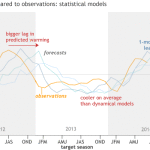
How Good Have ENSO Forecasts Been Lately?
By IRI Chief Forecaster Tony BarnstonThis post originally appeared on Climate.gov’s ENSO blog. Reproduced with permission. One of my responsibilities as the lead ENSO forecaster at IRI is to judge how well the forecasts have matched reality. One way I do this is I go back through the archived forecasts and make graphics that compare the forecasts […]
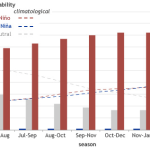
Why do ENSO Forecasts Use Probabilities?
By IRI Chief Forecaster Tony Barnston This post originally appeared on Climate.gov’s ENSO blog. Reproduced with permission. Many people are interested in knowing which ENSO category (La Niña, neutral or El Niño) is expected by the climate experts, just as they might want to know the weather forecast for tomorrow. They usually prefer a simple […]
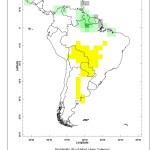
Climate Forecasts: A Vital Tool for Policymakers
Our friends at the Center for International Earth Science Information Network have written a nice post that explains how IRI’s seasonal climate forecasts have been for decision making, focusing on a particular case in Uruguay. In December 2010, reports showed that many areas of Uruguay were headed for drought. IRI’s seasonal precipitation forecast map issued in November […]
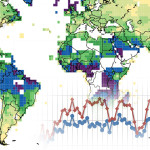
The Truth About Verification
In December 2011, the International Research Institute for Climate and Society issued a seasonal precipitation forecast. The forecast called for a 75 percent chance of above normal precipitation over parts of the Philippines between January and March. As the months played out, storms brought roughly eight inches more rain than usual for the period. That’s about 85 percent […]
Skill of real-time seasonal ENSO model predictions during 2002-2011–Is our capability increasing?
Author(s):
Climate Information Crucial to Help Reduce Risk and Limit Disaster Damage
Forecasts can play an invaluable role when used properly in helping humanitarian agencies and governments plan for and prevent disasters, according to the latest Climate and Society publication launched by the IRI and the American Red Cross last week in Washington D.C. Climate and weather disasters, from the massive floods in Pakistan, Australia and Colombia, to the […]

‘Democratizing’ Seasonal Forecasts in Latin America
A central tenet of the International Research Institute for Climate and Society is that providing people and institutions with climate information is just one step in a larger effort. There’s also a clear need to build the capacity of scientists to generate tailored information — and to help users ask for information relevant to them. […]
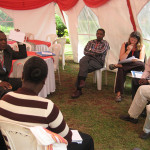
Climate Information Helps Prepare for Disasters
Climate-related disasters can have a devastating impact on human life and development. Globally, climate events including floods, droughts, cyclones, heat waves and mudslides contribute to tens of thousands of deaths, hundreds of thousands of injuries and billions of dollars in economic losses each year. In recent years, it’s become clear that such losses can be […]
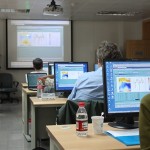
Creating More Useful Forecasts
Seasonal forecasts can be effective tools for agricultural planners,water resources managers and other decision makers. For example, after torrential rains and floods wreaked havoc in the West African nation of Ghana in 2007, displacing some 400,000 people here, the regional office of the International Federation of Red Cross and Red Crescent Societies started using seasonal […]
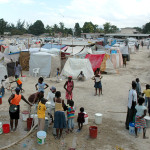
Climate Risks in Haiti
In this Q+A, IRI staffers discuss some of the climate-related risks that could affect Haitians over the next year as they struggle to rebuild their country after a devastating earthquake in January. Currently, about 1.2 million Haitians are without proper shelter, and an additional 470,000 have been displaced from their homes, according to the U.N. […]

Climate and Coconuts
Millions of people in the tropics depend on coconuts for food, raw materials and livelihood. Coconuts are also a high value commercial crop. But like any crop, coconuts are at risk of drought and other prolonged events. By using climate science and better agricultural forecast models, the IRI has helped increase the resilience of coconut […]

An Interview with Graeme Hammer
This is the first of an ongoing series of interviews with prominent thinkers in the area of climate risk management. Over the next year, we will be sharing their insights on how climate science and information can help meet the goals of development and adaptation. These individuals are pioneers in fields as diverse as climate […]
